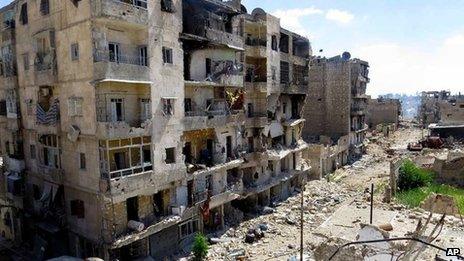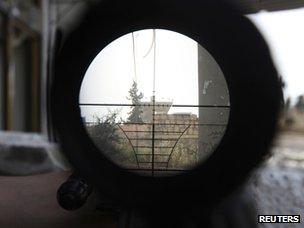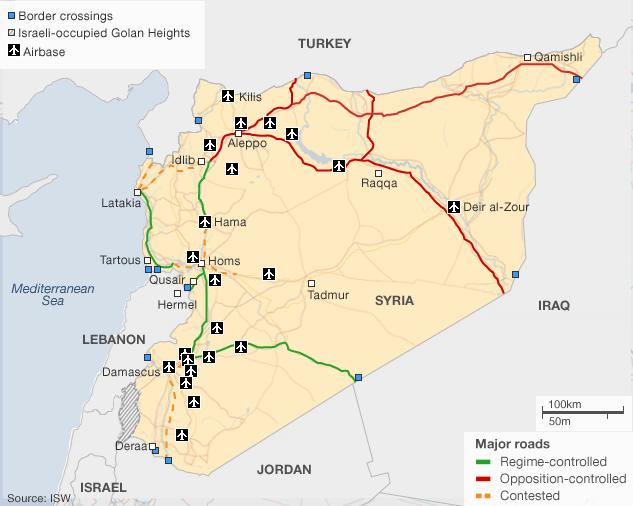Syria troops 'preparing for Aleppo assault'
- Published

Aleppo has been carved up into areas controlled by rebels and the government
Syrian government forces are reported to be preparing for a major offensive on rebel-held parts of the northern city of Aleppo and its surroundings.
A Syrian security source said it would start "in the coming hours or days".
Opposition activists in the city told the BBC that military reinforcements, including Hezbollah fighters, had been sent to parts of Aleppo.
Government forces backed by Hezbollah, the Lebanese Shia Islamist group, last week recaptured the town of Qusair.
On Sunday, they retook the last remaining rebel-held villages in the strategically important area, which lies between the Lebanese border and the central city of Homs.
In view of the Syrian regime's rapid advance, Washington could decide this week at meetings involving top security officials to start arming the rebels, US officials say.
A State Department spokeswoman said on Monday that the US would "continue to look for ways to help the opposition and increase aid... The president has talked about how boots on the ground is not an option - so all options short of that".
'Northern Storm'
Much of northern Syria has been controlled by rebel groups since last year, and the front lines inside Aleppo have been largely static for months.
However, the fall of Qusair last Wednesday has reportedly been seized on by the military leadership in Damascus as a decisive victory.
On Monday, opposition activists in Aleppo told the BBC that military reinforcements and weapons had been sent to militias loyal to President Bashar al-Assad in north-western parts of the city.
The army would be trying, they said, to recapture towns in the northern and southern countryside of the city to control vital supply lines from Turkey.
The activists added that the ultimate goal was to fully control the heart of Aleppo.
An article in the pro-government Syrian newspaper, al-Watan, said earlier that the army was now "deploying heavily in the countryside near Aleppo in preparation for a battle that will be fought inside the city and on its outskirts".
"Besieged areas will be freed in the first stages and troops which have been on the defensive will go on the offensive."
It added: "The Syrian army will take advantage of its experience in Qusair and Eastern Ghouta [near Damascus] to advance in the provinces of Hama and Homs."
Meanwhile, the Syrian security source also said the government's next target was Aleppo.
"It is likely the battle for Aleppo will start in the coming hours or days, and its aim is to reclaim the towns and villages in the province," the source told AFP news agency.
The planned offensive is reportedly named Operation Northern Storm.
On Sunday, fierce fighting was reported in Nubbul and Zahra, two villages on the outskirts of the city that are predominantly Shia Muslim.
A rebel commander and former senior military officer, Brig Gen Mustafa al-Sheikh, said the government had been using helicopters to reinforce its positions with loyalists, including Hezbollah fighters and Shia from Iraq.
"The [army's] aim is to use the two villages as forward bases to make advances in Aleppo and its countryside," he told Reuters news agency.
"The regime considers that it has received a shot in the arm after the Qusair battle, but they will find that it will not be easy to advance in Aleppo."
Local activist Abu Mujahid said troops backed by Hezbollah militants had attempted to break a rebel siege of a military airport in the town of Minnig, near Zahra and Nubbul, and that the rebels were monitoring activity at the nearby Salamiya army base.
Hezbollah's leader, Hassan Nasrallah, declared at the end of May that the group had sent fighters to Syria to assist forces loyal to President Assad, and vowed to fight to the end to defeat the rebellion and defend Lebanon from jihadist extremists.

Rebels are said to be monitoring troop movements in government-held areas and military bases
'Public execution'
In a separate development on Sunday, the Syrian Observatory for Human Rights (SOHR) reported that Islamist rebels in Aleppo had executed a 15-year-old boy in front of his parents as punishment for what they regarded as a blasphemous comment.
The UK-based activist group said Mohammed Qataa was shot in the face and neck a day after being seized by the rebels, who allegedly overheard the teenager tell someone: "Even if the Prophet Muhammad comes down [from heaven], I will not sell on credit."
Before executing the boy, one of the rebels reportedly told onlookers: "Disbelieving in God is polytheism and cursing the Prophet is polytheism. Whoever curses even once will be punished like this."
The SOHR published a photograph of what it said was the boy's face, which bore gunshot wounds to the mouth and neck. Its director, Rami Abdul Rahman, said it could not "ignore these crimes, which only serve the enemies of the revolution and the enemies of humanity".
The main opposition body, the Syrian National Coalition, said that if the reports were true, it "would constitute a crime against humanity and those responsible must be brought to justice".
"The Syrian Coalition expects those taking part in the revolution to abide by the ideals and principles of international covenants and treaties," it said in a statement.
It blamed the alleged killing on "extremist factions" and urged people to support the main rebel group, the Free Syrian Army, saying it had "committed to adhering to human rights laws".
